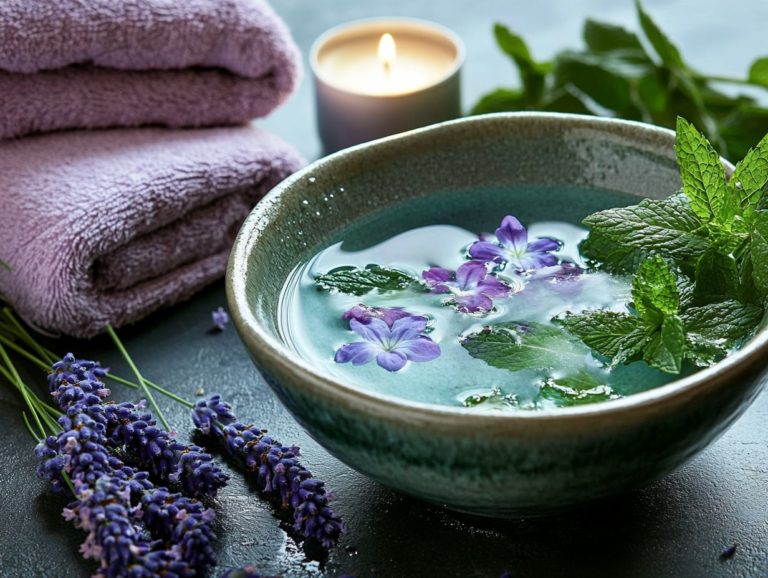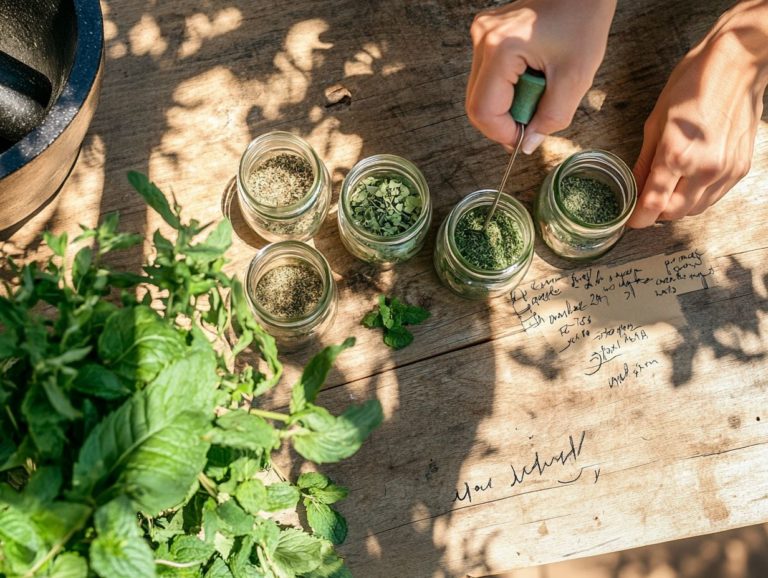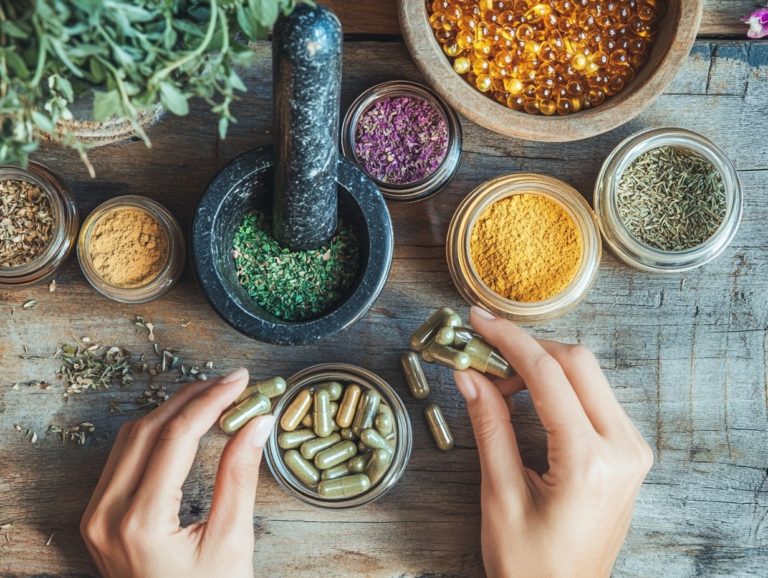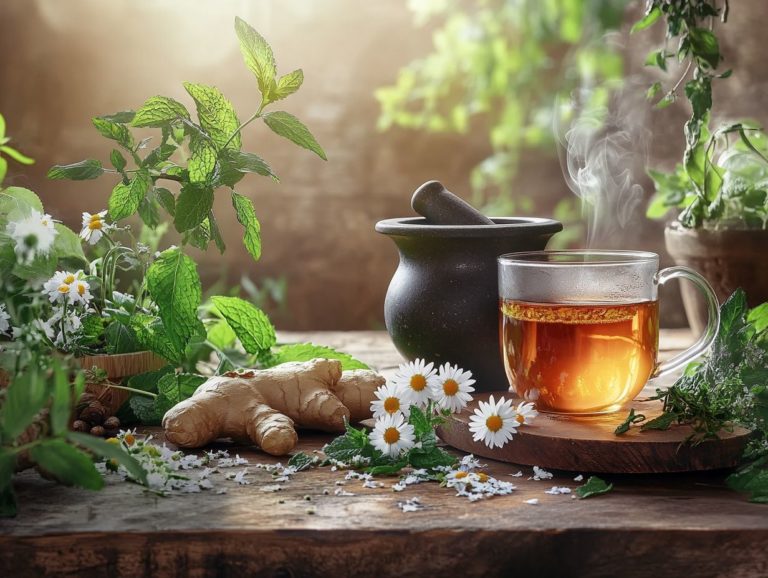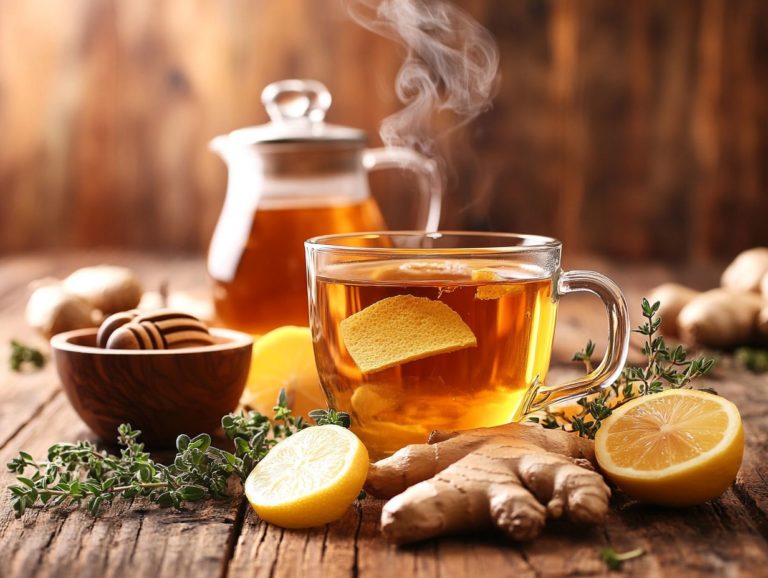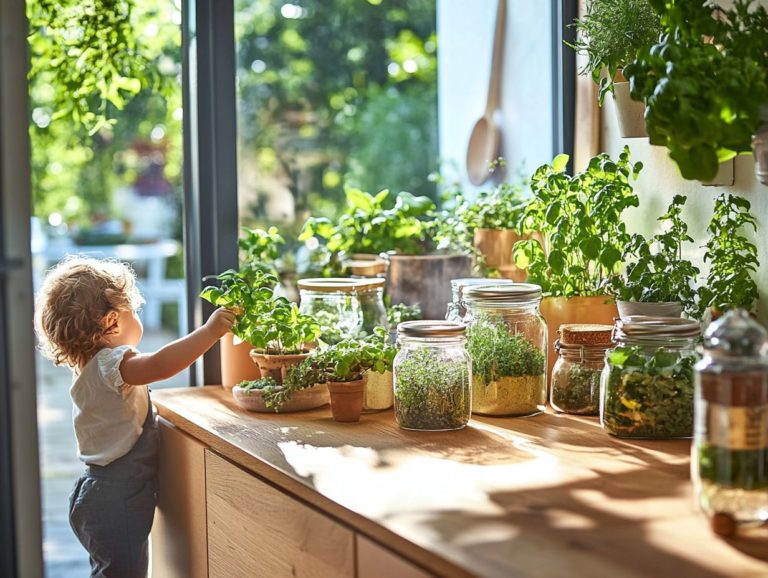How to Create Herbal Tinctures Easily
Discover the amazing potential of herbal tinctures! These powerful extracts are crafted from natural herbs in liquid form. They offer a multitude of advantages over traditional herbal remedies, especially when considering DIY herbal tinctures.
In this exploration, you’ll discover what herbal tinctures are, the benefits they provide, and how to choose the right herbs tailored to your needs, including various tincture ingredient basics.
A straightforward step-by-step guide will lead you through the process of making your tincture at home, complete with tips for proper storage and usage.
Tinctures can easily be customized to fit your specific health needs. Whether you re a seasoned herbalist or a curious beginner, this guide has something valuable for you, including insights on herbal medicine and herbal remedies.
Contents
- Key Takeaways:
- Understanding Herbal Tinctures
- What are Herbal Tinctures?
- Benefits of Using Herbal Tinctures
- Choosing the Right Herbs for Tinctures
- Creating Herbal Tinctures at Home
- Storing and Using Herbal Tinctures
- Troubleshooting Common Issues
- Frequently Asked Questions
- What is a herbal tincture and why should I make one? What are the herbal tincture benefits?
- What supplies do I need to make herbal tinctures easily? Consider adding tincture ingredient basics to your list.
- How do I choose the right herbs for my tincture?
- What is the process for creating herbal tinctures easily?
- How long do herbal tinctures last and how should I store them?
- Can I use fresh herbs instead of dried herbs for my tincture?
Key Takeaways:
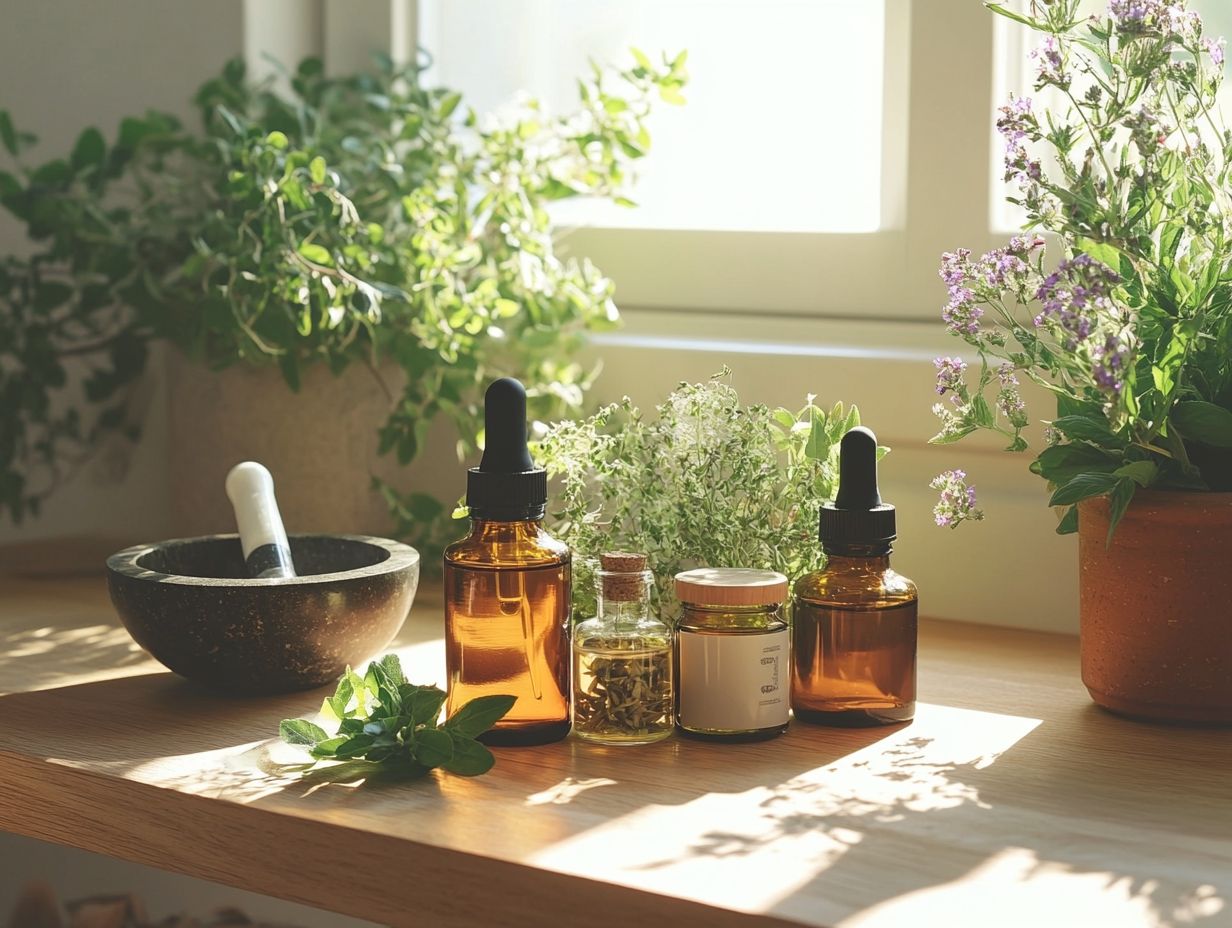
- Understand the benefits of using herbal tinctures, including their advantages over other forms of herbal medicine.
- Choose the right herbs for tinctures by considering factors such as their medicinal properties and potency.
- Create herbal tinctures easily at home with a step-by-step guide and proper storage and dosage guidelines.
Understanding Herbal Tinctures
Understanding herbal tinctures requires recognizing these concentrated extracts crafted from natural herbs infused in high-proof alcohol, such as vodka, gin, or brandy. They can be a remarkable addition to your herbal medicine cabinet.
You can effectively use these tinctures to harness the medicinal properties of various plants. They deliver potent extracts that cater to your specific needs be it immune support from echinacea or the calming effects of lavender, alongside other herbal preparations.
By mastering the art of tincture-making, you enable yourself to customize tinctures with precision and intention, ensuring you select high-quality ingredients.
What are Herbal Tinctures?
Herbal tinctures are concentrated liquid extracts crafted from natural herbs, typically using high-proof alcohol as a solvent to extract their beneficial compounds. This makes them a favored choice among herbal enthusiasts.
This method of extraction allows tinctures to retain the essential properties of the herbs far more effectively than other preparations, such as herbal teas or capsules. For those interested in a different approach, consider exploring homemade herbal salves. The process is simple yet meticulous: you soak the selected herbs in alcohol for several weeks, allowing the alcohol to draw out a range of natural compounds from plants that have health benefits, including alkaloids, flavonoids, and other therapeutic compounds.
You can choose from a variety of herbs, spanning from familiar favorites like echinacea for immune support and chamomile for relaxation to more exotic selections, such as turmeric, which offers numerous benefits. Unlike herbal extracts, which may come in different forms such as powders and oils, tinctures provide a highly concentrated liquid form that’s both easy to use and administer, making them a preferred choice for many.
It s no wonder that herbal tinctures are a favored choice for those in search of potent natural remedies.
Benefits of Using Herbal Tinctures
The benefits of using herbal tinctures are truly remarkable; they provide you with a concentrated form of herbal remedies that delivers potent extracts, allowing you to experience the therapeutic effects of natural herbs in a highly convenient format, including alcohol-free tinctures for those seeking alternatives.
Many enthusiasts admire the rapid absorption and extended shelf life of tinctures, which elevate their practicality in your daily wellness routine, making them an invaluable component of herbal medicine. Additionally, for those looking to diversify their herbal options, learning how to prepare herbal syrups at home can provide a customized approach to address specific health concerns, making them an invaluable addition to any herbal medicine cabinet.
Advantages over Other Forms of Herbal Medicine
Herbal tinctures provide numerous benefits over other forms of herbal medicine, such as teas or capsules, thanks to their strong extracts and ease of use. They boast a longer shelf life and allow for the use of high-quality ingredients.
Unlike teas, tinctures can last for years when stored correctly, contributing to the impressive shelf life of tinctures. This longevity makes them a more sustainable option for those looking to build a stockpile of herbal remedies. For those interested in creating their own, crafting your own herbal remedies at home is remarkably straightforward; just a few drops can be taken directly or mixed into beverages, serving as a convenient alternative to the preparation involved with herbal teas or the precise dosing required for capsules.
With tinctures, you have the power to customize your blends to meet your specific health needs, such as incorporating flower tinctures or root tinctures for varied effects. For instance, you might combine echinacea for immune support with valerian root for relaxation. If you’re also interested in creating delicious beverages, learning how to make your own herbal tea at home can be a fantastic addition. This unique flexibility distinguishes tinctures from traditional herbal remedies, offering an exceptional blend of accessibility and effectiveness.
Choosing the Right Herbs for Tinctures
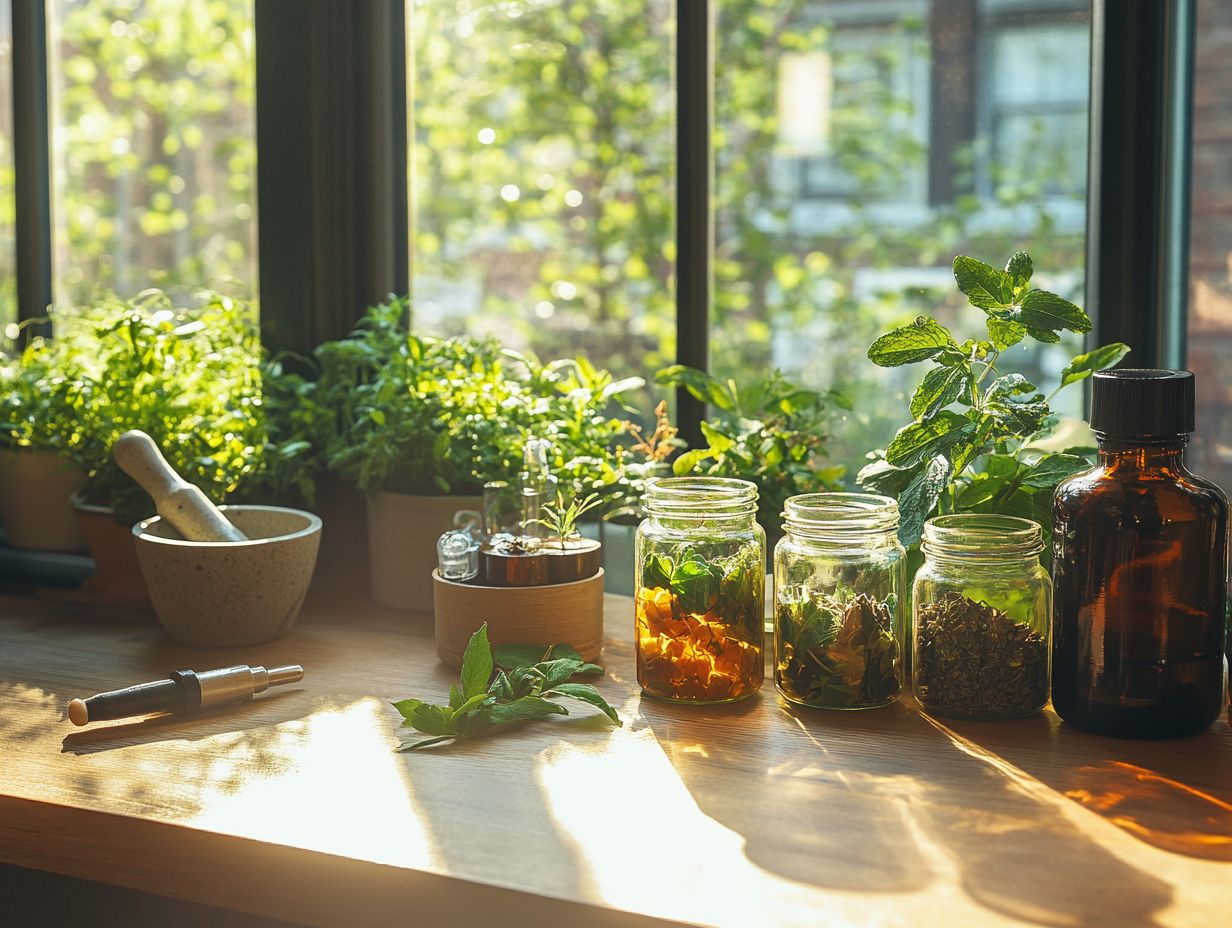
Selecting the right herbs for your tinctures is essential in crafting effective herbal remedies. This includes choosing between fresh and dried herbs for the best potency. Each herb brings its own unique properties think chamomile for relaxation, echinacea for immune support, and peppermint for digestive health.
By understanding the individual characteristics of these botanicals, you can create tinctures specifically tailored to your needs, guaranteeing that the final product is both potent and effective.
Factors to Consider
When you re selecting herbs for tinctures, keep in mind several key factors, such as the quality of the herbs, the type of alcohol used, and how these elements come together to create a well-rounded formulation.
Choosing between fresh and dried herbs can significantly impact both potency and flavor. Fresh herbs typically offer fresh oils and nutrients, while dried herbs deliver a concentrated essence that can be quite powerful. The type of alcohol you choose be it vodka, gin, or brandy plays a pivotal role in extracting the beneficial properties from the herbs, making it essential for tincture formulation.
It’s crucial to consider the intended purpose of your tincture, whether you aim for relaxation, digestive health, or immune support. Selecting the right herbs that align with your goals enhances effectiveness and ensures a more focused approach. Additionally, following safety tips for creating herbal remedies is essential to ensure your preparations are both safe and beneficial.
Creating Herbal Tinctures at Home
Making herbal tinctures at home is an exciting and fulfilling journey! You can harness the remarkable power of natural herbs using strong alcohol that helps extract plant benefits.
By following a step-by-step guide, you can master the art of tincture-making and explore different types of tinctures. Ensure you select high-quality ingredients and follow precise recipes to produce extracts tailored to your unique health needs.
This DIY approach not only allows for customization but also fosters a deeper understanding of ways to use herbs for health, enriching your connection to the natural world.
Don t miss out on the chance to create your personalized remedies!
Step-by-Step Guide
Creating herbal tinctures is a rewarding process. It involves careful selection of high-quality ingredients, soaking your selected herbs in high-proof alcohol, and allowing for effective extraction. This results in potent tinctures, showcasing the importance of alcohol extraction.
This meticulous approach preserves the beneficial properties of the herbs and enhances the potency of the final product. It’s essential to understand the tincture-making process. Start by choosing fresh or dried herbs that are organically grown. For those interested in further enhancing their herbal preparations, following these simple steps to create herbal-infused oils can be beneficial. The quality of your ingredients plays a crucial role in the tincture’s effectiveness, highlighting the quality of tincture ingredients.
The maceration period lasts from two to six weeks. During this time, the alcohol extracts the active compounds from the herbs. Remember to shake the mixture gently every few days to encourage optimal extraction. For those interested in a more hands-on approach, consider exploring herbal remedies: creating your own capsules and follow tincture safety tips for best results.
Once the maceration period is complete, strain the mixture through a fine mesh or cheesecloth. This effectively separates the liquid from the solid remnants, ensuring tincture preservation. This extracted liquid, rich in herbal compounds, forms the tincture ready to support your journey toward health and wellness, with various tincture applications available.
Storing and Using Herbal Tinctures
To keep your herbal tinctures effective, proper storage and dosage are key! The shelf life of tinctures can fluctuate depending on storage conditions and the quality of the ingredients. It’s important to prioritize tincture ingredient quality.
Ensure that your tinctures are kept in dark, cool spaces away from direct sunlight. This maximizes the preservation of their beneficial properties, enhancing tincture safety. It’s important to understand tincture usage and dosage guidelines for safe consumption, helping you gauge the appropriate amount for your needs.
Proper Storage and Dosage Guidelines
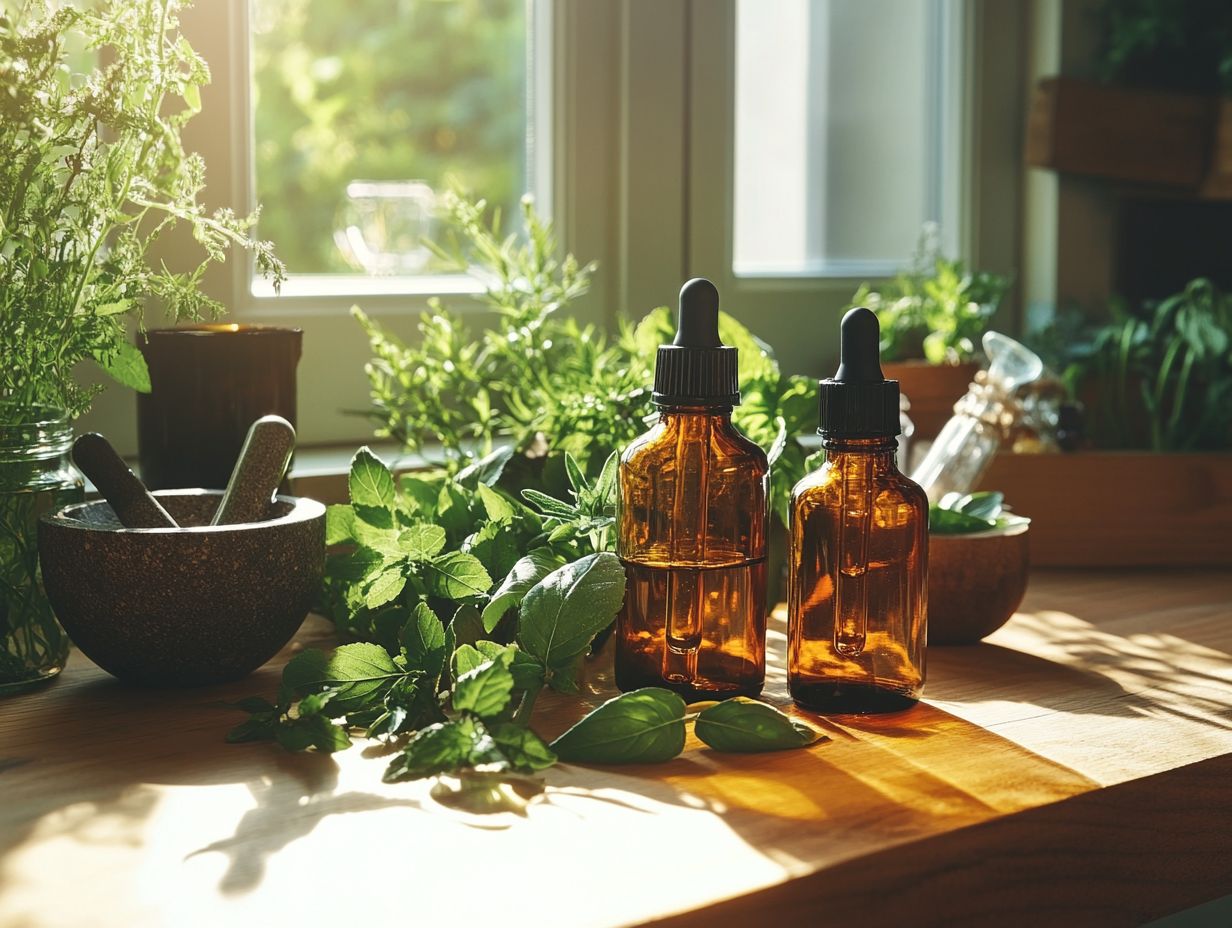
Proper storage and dosage guidelines for herbal tinctures are crucial to maintain their longevity and efficacy. Inadequate conditions can significantly compromise their quality, impacting how long they remain effective.
To maintain the potency of these concentrated extracts, use dark glass containers amber or cobalt bottles work wonders. They shield your tincture from harmful light exposure, ensuring tincture safety. Keep your tinctures away from direct sunlight and store them in a cool, dry place. Don’t forget to tightly seal the bottles; this simple step prevents air contamination that could diminish their effectiveness, underscoring the importance of tincture safety.
Regarding dosage, it’s wise to start with a low amount, usually just a few drops. Gradually increase as needed, allowing you to customize tinctures based on your tolerance. For those interested in creating herbal remedies, learning how to make herbal balm at home can be a great addition. By adhering to these best practices, you can ensure that your tinctures remain safe and effective for consumption, enhancing your overall experience with tincture recipes and methods.
Troubleshooting Common Issues
Troubleshooting common issues in tincture making is essential for a successful outcome. By addressing frequently asked questions and offering tincture safety tips, you can significantly enhance your tincture-making process.
Understanding the potential challenges that may arise during preparation and storage enables you to craft high-quality tinctures that effectively deliver the desired health benefits.
Tips for Successful Tincture Making
To ensure your tincture-making journey is a success, it’s vital to embrace a few key tips. Focus on using high-quality ingredients and important safety steps. Gain a thorough understanding of the entire tincture-making process.
When selecting herbs, prioritize organic and sustainably sourced options. These selections often have the potency necessary for effective extraction. For those just starting out, exploring 5 essential herbal preparations for beginners can be incredibly helpful. Implement rigorous safety measures. Make sure your equipment is properly sterilized and label your creations carefully.
Understanding proper dosage is another important factor. Being well-informed about dosages allows for safe consumption without adverse effects and enhances the tincture’s benefits. This knowledge provides peace of mind, whether you re crafting for personal use or sharing your creations with others.
Follow these tips to craft powerful tinctures that impress and delight!
Frequently Asked Questions
What is a herbal tincture and why should I make one? What are the herbal tincture benefits?
A herbal tincture is a concentrated liquid extract made from herbs. It is an easy and convenient way to consume medicinal herbs and can have a longer shelf life than dried herbs. By making your own herbal tinctures, you have control over the ingredients and can customize them to your specific needs.
What supplies do I need to make herbal tinctures easily? Consider adding tincture ingredient basics to your list.
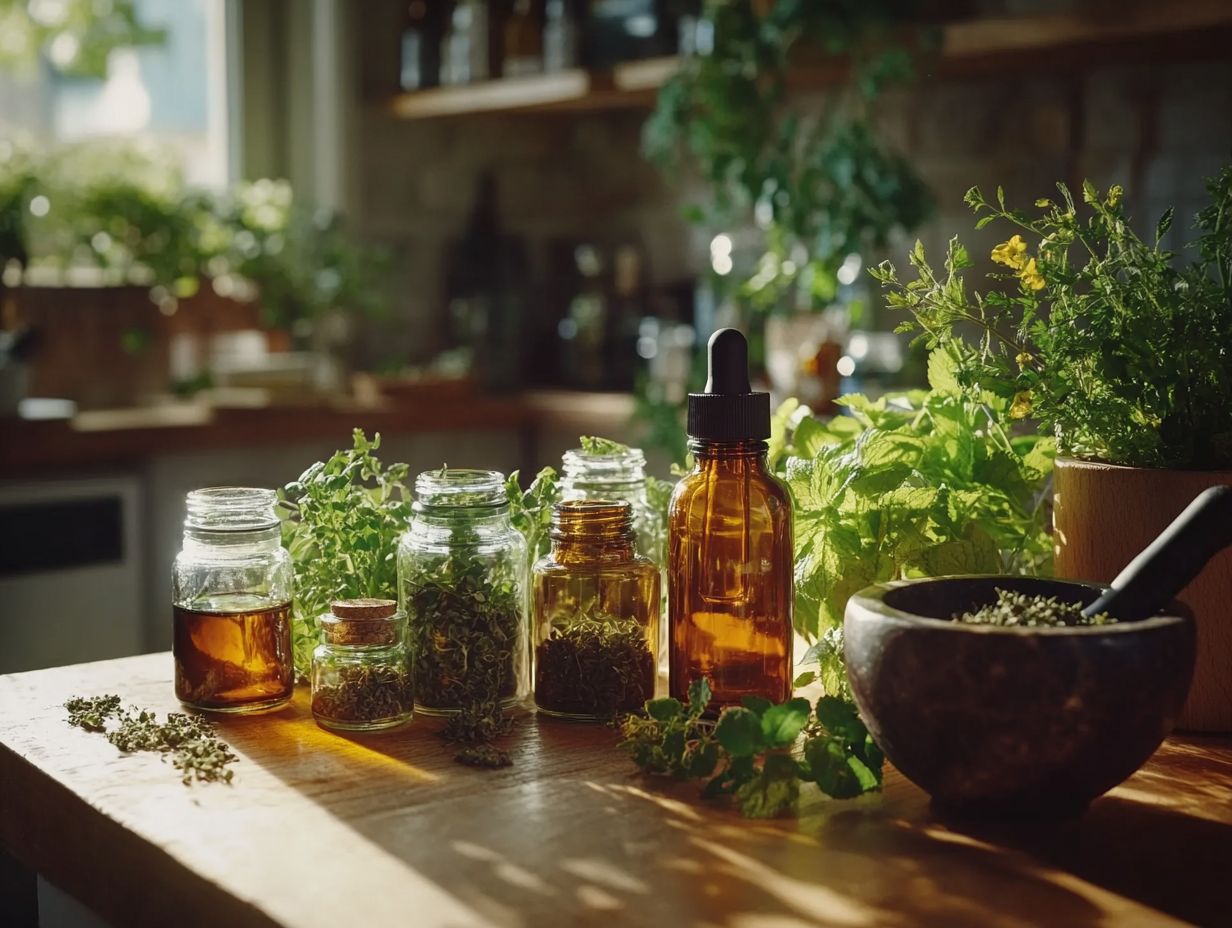
You will need a glass jar with a lid, high-proof alcohol (such as vodka or brandy), dried herbs, a label, and a strainer or cheesecloth. You may also want to have a funnel and dropper bottles for easier storage and consumption.
How do I choose the right herbs for my tincture?
Choose herbs that are known for their medicinal properties and are safe for consumption. You can either research herbs and their uses or consult with a qualified herbalist. It’s also important to make sure the herbs you choose are organic and free from pesticides.
What is the process for creating herbal tinctures easily?
Start by filling your glass jar about 1/3 to 1/2 full with dried herbs. Then, pour enough alcohol to cover the herbs completely. Close the jar and let it sit in a cool, dark place for 4-6 weeks, shaking it daily. After that time, strain the liquid into another jar, label it, and store it in a cool place. Your tincture is now ready to use!
How long do herbal tinctures last and how should I store them?
If stored properly, herbal tinctures can last for several years. Make sure to label your tincture with the date and ingredients used. Store it in a cool, dark place to maintain its potency. You can also store it in the refrigerator for a longer shelf life.
Can I use fresh herbs instead of dried herbs for my tincture?
Yes, you can use fresh herbs, but they will need to be chopped or crushed before being placed in the jar. Keep in mind that fresh herbs contain more water and may dilute the alcohol, resulting in a weaker tincture. It’s recommended to use dried herbs for a more concentrated tincture.
Get started on your tincture-making adventure now!

